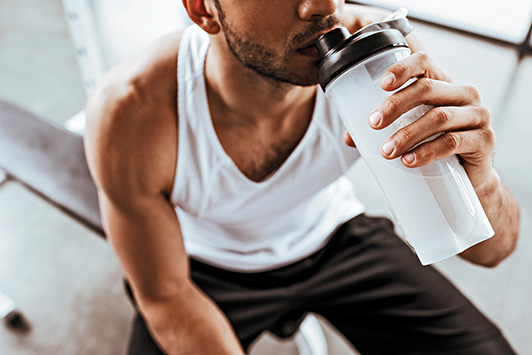Replacing nutrients and rehydrating the body after sport is an important way to promote muscle repair and replenish energy, and athletes are always looking for an edge. Many rely on optimal nutrition to help fuel their sport and post-exercise recovery. Milk is a go-to recovery beverage for athletes because of its unique mix of nutrients, including fluid, protein, carbohydrates and electrolytes.
Why is milk a uniquely appropriate sport recovery drink?
Milk naturally contains a mixture of high-quality protein (with all essential amino acids), carbohydrates, water and sodium, which are all nutrients that are required after sport. Plus, milk is considered to be isotonic (osmolality of 280–290 mosmol/kg). All of these have been shown to independently enhance rehydration after sport.
Studies show that drinking milk after exercise can support both acute recovery and chronic training adaptation. Milk is also known to reduce post-exercise muscle soreness, reduce muscle loss, and reduce symptoms of stress after sport, even more than carb-based sport recovery drinks.
Nutrients in milk and how they help with sport recovery
1. Protein and muscle synthesis
Protein helps the body repair the muscles that were used during exercise. Milk contains whey and casein proteins, which enhance post-exercise muscle protein synthesis rates. Milk also has a high concentration of branched-chain amino acids (such as leucine) to support muscle protein synthesis.
Plus, the protein in milk adds to post-exercise muscle protein synthesis and rehydration.
2. Carbohydrates and glycogen synthesis
Milk contains carbohydrates in the form of lactose, which can act as a fuel source before and during exercise. Lactose may also play a role in a post-exercise recovery by optimizing muscle and liver glycogen, which is the storage form of carbohydrates in the body. Lactose may also act as a prebiotic, which can promote beneficial changes to gut microbiota. Chocolate milk, which contains added sugars in addition to the natural occurring lactose sugar, may be more advantageous when additional carbohydrate is needed, such as training for a triathlon or being in a sports tournament.
3. Fluid, electrolytes and hydration
Milk contains a high concentration of electrolytes, including calcium, sodium and potassium, which facilitate fluid recovery, rehydration, and electrolyte replenishment following exercise (when fluid is lost through sweat). They also help improve the recovery of skeletal muscle. One study showed that gradually drinking milk restored fluid balance better than water or carbohydrate electrolyte drinks, due to how these beverages are digested. Milk is released more slowly from the stomach compared to water or sports drinks, and dairy proteins contribute to this beneficial effect.
How to get the most out of milk: practical advice
Studies show that resistance training can be paired with 20 grams of high-quality milk-based protein to provide anabolic stimulus for muscle protein synthesis. Each cup of milk contains 9 g protein, so you need about 2 cups for post-workout muscle recovery. Milk can be used in smoothies or enjoyed as-is. The other benefit to milk is that it’s readily available, making it a convenient and easy option to facilitate post-exercise recovery.
Conclusion:
Whether it’s a weekday hockey game, a weekend run or a week-long volleyball tournament, milk is an excellent beverage to promote glycogen storage, muscle synthesis and rehydration.



